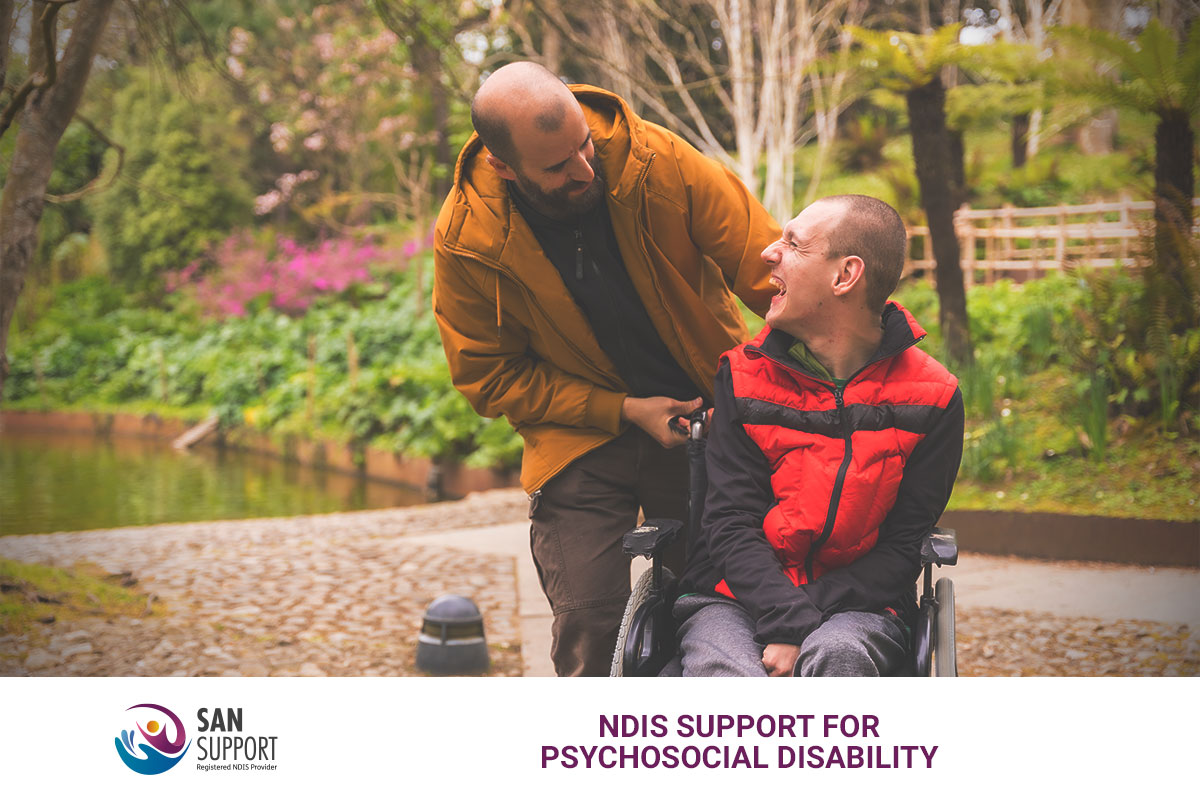
Psychosocial disability can significantly affect how a person functions in daily life. If you experience long-term mental health challenges that limit your ability to live independently, work or participate in your community, you may be eligible for the National Disability Insurance Scheme (NDIS).
In this article, we explain what psychosocial disability means, how it differs from a mental health condition and how you can access NDIS support if your mental health impacts your everyday functioning.
Understanding the Difference Between Mental Health Conditions and Psychosocial Disability
Before applying for support, it is important to understand the difference between a mental health condition and a psychosocial disability. Although the two terms are related, they do not mean the same thing.
What Is a Mental Health Condition?
A mental health condition refers to a psychological issue that may affect your mood, thinking or behaviour. These conditions vary widely and may be short-term or chronic. Common examples include:
- Depression
- Bipolar disorder
- Anxiety disorders
- Schizophrenia
- Obsessive-compulsive disorder (OCD)
However, not everyone with a mental illness experiences it in the same way. For some, the condition is manageable with treatment. For others, especially those with long-term symptoms, it can cause serious limitations in day-to-day life.
What Is a Psychosocial Disability?
While a mental health condition is a diagnosis, psychosocial disability is defined by impact. You may have a mental health condition without having a psychosocial disability. However, if your condition severely affects your ability to:
- Work or keep a job
- Maintain relationships
- Manage daily tasks like cleaning or cooking
- Take care of your personal wellbeing
- Navigate public spaces or certain environments
then you may be considered to have a psychosocial disability.
Importantly, the NDIS focuses on how your condition impacts your functioning, not just the diagnosis. Therefore, even without a formal diagnosis, you may still qualify for NDIS support if your condition causes substantial limitations in your life.
Does the NDIS Support Psychosocial Disabilities?
Yes, the NDIS recognises psychosocial disability as a form of disability. However, to receive NDIS support, you must meet specific eligibility requirements.
You May Be Eligible If:
- You are under 65 years of age
- You are an Australian citizen, permanent resident or Protected Special Category Visa holder
- You live with a mental health condition that causes significant, ongoing functional limitations
- You require lifelong support to participate socially and economically
- You can provide evidence of how your condition impacts your life
The NDIS does not require a specific diagnosis but you must clearly demonstrate how your mental health condition s to perform everyday activities.
What Evidence Do You Need?
To apply for the NDIS, you need to show that your condition results in substantially reduced functional capacity. You do not need to navigate this alone your mental health professional, GP or current support provider can help prepare the necessary documentation.
Useful Evidence Includes:
- Reports outlining current or past treatments
- Functional assessments from a psychologist, psychiatrist or allied health professional
- Letters or statements that describe how your condition affects you daily
- Documentation showing how your condition impacts your ability to engage in life activities
Providing clear and well-supported evidence increases the chances of your application being approved.
What Areas of Life Does the NDIS Assess?
The NDIS assesses your functional ability across six life domains. You only need to show a substantial reduction in one area, although more evidence is always helpful.
- Social Interaction – Can you form and maintain relationships with friends, family or colleagues?
- Self-Management – Can you manage your finances, maintain housing or meet responsibilities?
- Self-Care – Are you able to maintain hygiene, take medication and eat healthily?
- Learning – Does your condition affect concentration, memory or ability to learn new skills?
- Communication – Do you struggle to express yourself or understand others?
- Mobility – Can you leave your home, navigate public transport or move around safely?
Remember, the NDIS wants to know how your mental health condition affects your ability to function, not just that you have a diagnosis.
What Supports Can You Receive Through the NDIS?
Once approved, your NDIS plan will be tailored to your individual goals and needs. Many supports aim to help you build confidence, develop life skills and maintain independence.
Common Supports for Psychosocial Disability:
- Psychosocial recovery coaching
- Support workers to help with daily tasks and personal care
- Capacity building supports focused on communication, social interaction and self-management
- Access to allied health services such as occupational therapy or psychology (when related to your disability)
NDIS-funded supports are non-clinical, meaning they are designed to help manage the impact of your condition not replace mainstream mental health treatments. For example, while the NDIS may fund behavioural support strategies, it will not cover general therapy sessions that fall under Medicare.
What If You are Not Eligible?
If the NDIS does not approve your application, you still have options. You can request:
- An internal review of the decision
- An external review through the Administrative Appeals Tribunal (AAT)
Meanwhile, your Local Area Coordinator (LAC) can connect you to community services, mental health supports and other programs that may meet your needs.
Even if you are not eligible for the NDIS, you still deserve access to appropriate and inclusive support.
Final Thoughts
If your mental health condition significantly impacts your ability to function in everyday life, you may qualify for NDIS support under psychosocial disability. Understanding the process and providing strong, relevant evidence can increase your chances of accessing the right services.
A successful application can open the door to practical, ongoing support designed to help you live with more independence, structure and confidence.
About SAN Support
At SAN Support, we work with NDIS participants living with psychosocial disability across Brisbane. Our team provides tailored, person-centred support. We believe everyone deserves the opportunity to live with dignity and direction. Our goal is to help you build the skills, structure and support networks you need to live a sustainable and empowered life on your terms.
